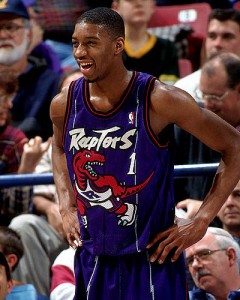Toronto has two strikes against it for most professional athletes

Former Toronto Raptor Tracy McGrady recently enlightened Torontonians as to why he left the Raptors.
This summer could be particularly heart-breaking for fans of the Toronto Raptors as they face the prospect of forward Chris Bosh, arguably the best player the team has ever seen, leaving the city as a free agent.
Toronto Blue Jays fans can sympathize with their basketball neighbours – this summer they lost ace Roy Halladay in a lopsided trade with the Philadelphia Phillies and Seattle Mariners.
It’s a familiar story for Torontonians. One of their teams will draft a player who becomes a star, but the franchise player eventually begins to grumble and complain about greener pastures, eventually demanding a trade or letting their contract expire and moving on via free agency.
Fortunately, NBA All-Star Tracy McGrady, a former Raptor, was in town and shed some light on the topic during a shoot-around with his teammates on the New York Knicks.
“Some guys do it for different reasons,” McGrady said. “[Bosh has] been here for quite some time now, and he's personally been successful. The team really hasn't done that much.”
And that’s the problem – teams in Toronto struggle against American competition. There are two main reasons for this:
1. The taxes in Canada limit team’s options when it comes to free agency.
Any professional athlete in a major sport (basketball, baseball, hockey) is going to earn in the high six figures.
In the United States, that would put them in the highest tax bracket, where they’d have to pay about 4.3% of their annual income to the federal government.
Employees in Canada who earn more than $126,264 pay 29% of their annual income to the federal government.
That is a jarring disparity. An athlete who earns $10 million per year on the Blue Jays or the Raptors would have to pay $2.9 million to the taxman. In the United States that same athlete would have to pay $430,000.
It’s tough to compete with other teams for prized free agents when they player will be losing 29% on the dollar just for signing on the dotted line.
2. Teams in Toronto offer less media exposure, making it a less attractive option for players.
Toronto is the biggest media centre in Canada, and actually stacks up pretty well against other North American cities in terms of population (fifth largest city, eighth largest metropolitan area).
However, sports teams based in Toronto get the short end of the stick when it comes to being televised on American networks.
Without a high profile in the United States an athlete can’t capitalize on their secondary source of income – endorsements and sponsorships. For example, Chris Bosh was drafted in 2003, the same year as LeBron James, Dwyane Wade and Carmelo Anthony. However, Bosh doesn’t even rank in the top 15 for jersey sales, and neither does Toronto for team sales. By comparison, all of Bosh’s draftmates rate highly on the list, even though they play for teams in smaller markets.
It all boils down to money. Professional athletes lose significant amounts of income from both of their main revenue sources, which makes Toronto a tough sell.
Some of you may be wondering why I haven’t mentioned hockey, a sport that has six teams in Canada? Simple, really.
Most hockey players are Canadian, and so they’re used to heavy taxation. The second largest group of players in the National Hockey League are European, who are also used to high taxes.
Beyond Sidney Crosby and Alexander Ovechkin, most players don’t expect, hockey players aren’t expecting much revenue from endorsements and sponsorship.
Also, the fact that there are six Canadian teams mitigates the lack of coverage in the United States - ESPN can ignore the Raptors and Blue Jays because they’re the only Canadian teams in the league, but when there’s at least one Canadian team playing every night and every franchise prominently features athletes from Canada, they’ve got no choice but to acknowledge non-American teams.
As an aside, all this adds to the fact that the Buffalo Bills, or any other team NFL team, would not work in Toronto.
All this is to say that in leagues where there is only one Canadian team (NBA, MLB and the MLS) there is a nearly unique set of challenges that face franchises based in Toronto. When the Raptors, Blue Jays and TFC struggle in the standings and begin to lose marquee players, it’s probably because they’re not grappling with the reality of the market.
Sure, a team can draft a young prospect, but it’s tremendously difficult to put together a team that can contend for the championship when so many players see Toronto as an undesirable city to play in.